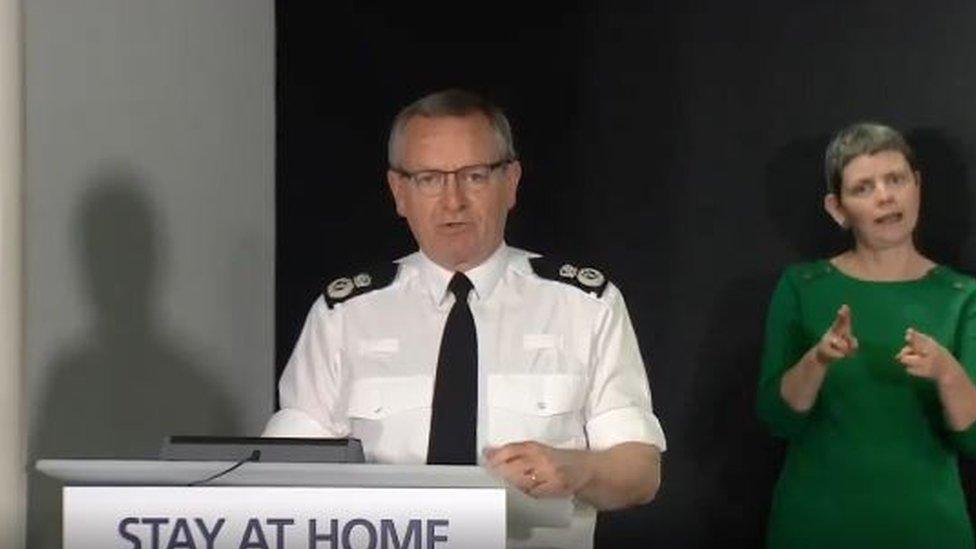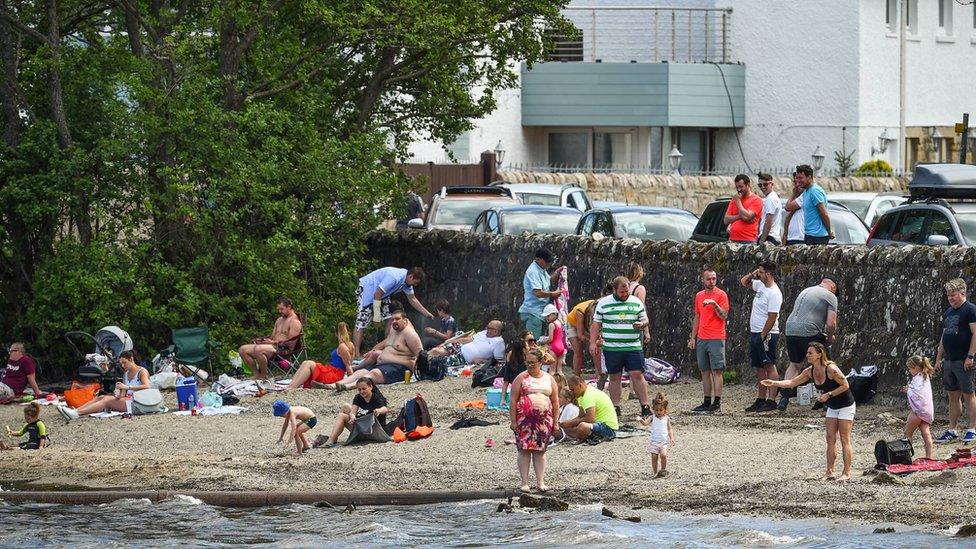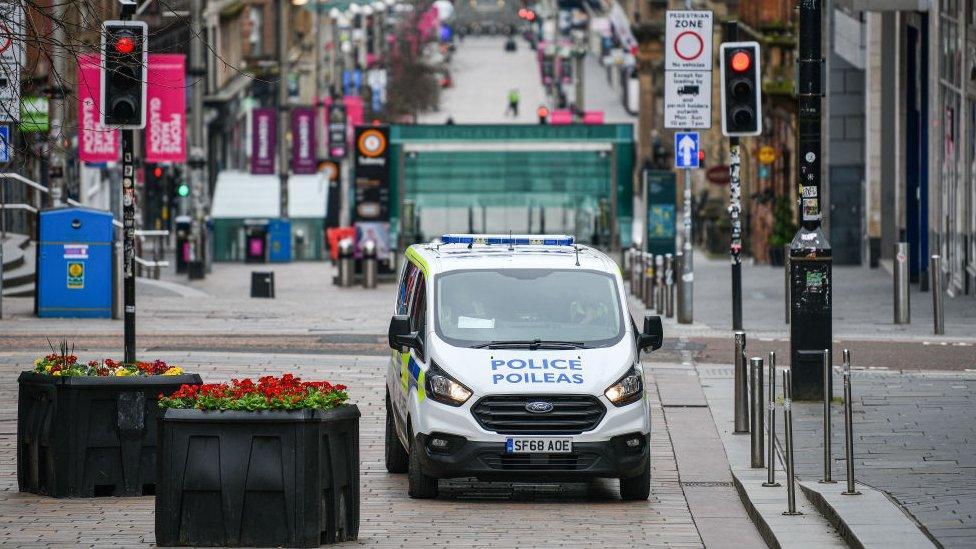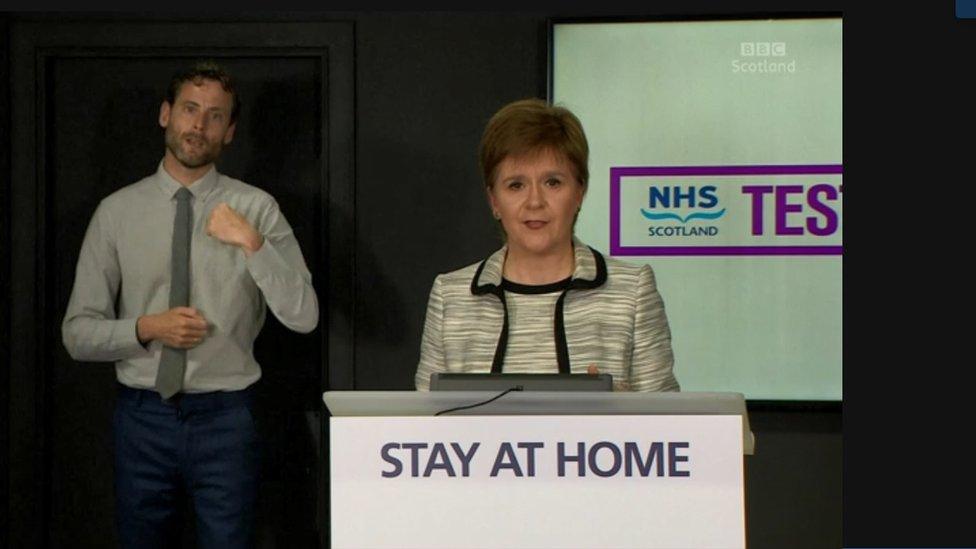Coronavirus: Crime 'returned to usual levels' as lockdown eased
- Published

Chief Constable Iain Livingstone joined Nicola Sturgeon at the daily briefing on the coronavirus pandemic
Crime returned to normal levels during the first weekend lockdown was eased, according to Scotland's most senior police officer.
Chief Constable Iain Livingstone said the arrest of more than 1,000 people for non-virus matters amounted to "business as usual".
He also urged racial injustice protestors to find a "safe way" to make their voices heard this weekend.
New figures revealed a fall in Covid-19 related fines and a rise in dispersals.
Speaking during the first minister's daily briefing Mr Livingstone said: "The small changes made last week following 10 weeks of strict lockdown rules, did coincide with particularly good weather and, in my judgement, perhaps did lead to some people feeling and acting a bit demob happy.
"Gatherings at parks, beaches, beauty spots were concerning, leading policing to make a little over 2,000 separate dispersals over the 72 hour weekend period.
"At the same time, we saw non-coronavirus related crime returning to levels which are more in line with business as usual."
The Police Scotland chief said the arrests placed "acute demand" on the service.
On Thursday it emerged the number of crimes recorded during April fell by 18%, including a 26% drop in sex crimes.
But last weekend marked the beginning of phase one of lockdown easing, which allows people to meet a limited number of friends and family outside.

Beaches at Loch Lomond were busy last weekend
With less tropical weather forecast this weekend he urged people to resist the temptation to hold house parties.
And Mr Livingstone encouraged people to call 101 if they are concerned their neighbours are breaching the regulations.
He added: "The police service will take very robust action in that regard because it is vital to control the spread of the virus.
"Don't have house parties if the rain comes on. Don't have your friends round."
The Police Scotland chief said he was "shocked and distressed" by the death of George Floyd in Minneapolis but also echoed Nicola Sturgeon's call for Scots not to gather for protests.
Mr Livingstone added: "I fully understand the desire of people in Scotland to make their voices heard this weekend over racial injustice.
"Our duty in policing is to enable you to have your voice heard in a way that is safe for you and safe for others. Please do so in a way that does not risk spreading coronavirus."
The chief constable repeated the warning that the current guidance could become law if people continue to flout it.
Allow X content?
This article contains content provided by X. We ask for your permission before anything is loaded, as they may be using cookies and other technologies. You may want to read X’s cookie policy, external and privacy policy, external before accepting. To view this content choose ‘accept and continue’.
It later emerged the number of fines issued by Police Scotland to people who breached the Covid-19 restrictions dropped by 56% last week.
The weekly number of arrests also fell from 30 to 11.
The statistics reveal 110 fixed penalty notices were handed out compared to 252 the previous week. This brings the total since the measures were introduced to 3,213.
Fines start at £30, doubling to £60 if they are not paid within 28 days. Repeat offenders can face penalties of up to £960.
But the update, for week ending 3 June, reveals the number of individuals dispersed using "reasonable force" doubled from 18 to 36.
Major increases were also recorded in the number "dispersed when instructed", which soared from 654 to 2,107, while the number "dispersed when informed" increased by 13% to 4,357.
Earlier in the day Mr Livingstone attended a passing out parade for 173 officers at the the Scottish Police College in Tulliallan, Fife.
Family and friends were unable to attend the ceremony in person but it was live streamed online.

40,000 DEATHS: Could they have been prevented?
FACE MASKS: When should you wear one?
TESTING: Who can get a test and how?

- Published4 June 2020

- Published28 May 2020
